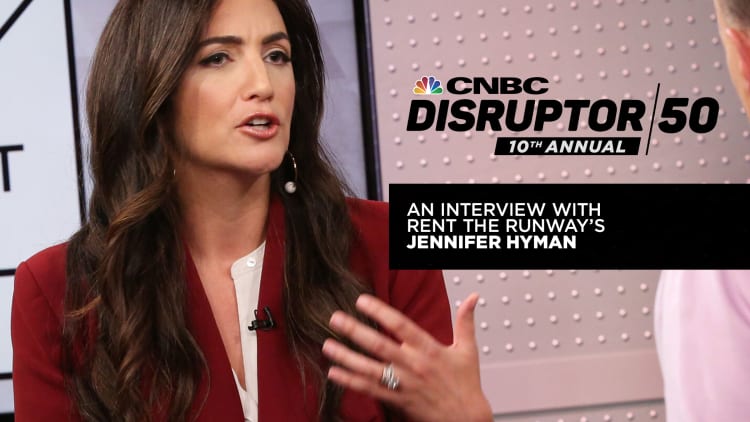In this weekly series, CNBC takes a look at companies that made the inaugural Disruptor 50 list, 10 years later.
More than 50% of clothing hanging up in someone's closet is only worn a handful of times before being discarded, according to Rent the Runway CEO Jennifer Hyman.
That's why she, along with co-founder Jenny Fleiss, started the fashion rental and subscription business Rent the Runway in 2009 – a service the company has coined a "closet in the cloud."
"Providing women with access … to an unlimited closet and the ability to wear whatever she wants without having to own it, that was really the underpinning of Rent the Runway – this idea that actually there was a better way to have variety in your wardrobe than just buying and throwing away," Hyman said in an interview with CNBC's Julia Boorstin in August.
With more than 800 brand partnerships, sizes ranging from 00-22, and three main subscription plans, Rent the Runway's business model of helping women to stay up-to-date with constantly evolving fashion trends — without breaking the bank or repeating their outfits — found early success. Customers can rent items for as long as they'd like and have the option to purchase any pieces they love. The company estimates that with their eight-item monthly plan, customers have the opportunity to sport more than $4,000 worth of designer clothing every month for less than $18 per item.
In its first decade of existence, Rent the Runway says it reached more than 11 million members. It also was named to the CNBC Disruptor 50 list five times, most recently ranked No. 5 in 2019.
But with a heavy reliance on subscribers renting outfits largely to wear at in-person events and gatherings, the Covid-19 pandemic hit the company hard and it had to make many hard decisions to keep the business going. In 2020, its active subscriber count fell almost 60% to about 55,000 from about 133,000 the prior year, and it experienced a net loss of $171.1 million compared to its $153.9 million loss in 2019.
Rent the Runway slashed costs at the onset of the pandemic. It also rewrote the terms with its suppliers to pivot to a revenue-sharing consignment model, different from its initial wholesale model that required a capital spend upfront without a guaranteed payback. It revamped its membership plans and did away with its unlimited subscription option. It began an expansion into the resale market, allowing customers to shop its selection and purchase gently used items without having a membership.
Rent the Runway also had to backtrack on its bricks-and-mortar expansion. It opened its first retail store location in New York City in October 2014 and eventually established four additional stores in major cities across the U.S. After it closed down all retail locations and laid off all retail staff members in March 2020 – citing a need to "dramatically reassess" its business model – Rent the Runway announced in August 2020 that it did not plan to reopen any of its stores in an effort to focus on online innovations and adding more drop boxes where customers could return clothes.
Its valuation reportedly took a hit during this period too, with a fundraising during the pandemic lowering the start-up below its previous $1 billion valuation and so-called unicorn status.
But the company bounced back, and Rent the Runway completed an IPO in October 2021, following a trend of stylish, direct-to-consumer brands — and fellow Disruptor 50 companies — such as Warby Parker, which went public in the stock offering boom of 2021.
"Because of the fact that we've been cooped up for the last two years, we've not been attending holiday parties and weddings and dinners with our friends and vacations," Hyman told CNBC in the August interview. "I think that there's even more demand than ever to have those experiences."

The company reported just over 124,000 active subscribers, representing 27% growth year over year, and a 64% year-over-year revenue increase in its fiscal 2022 second quarter results, released in September. And with a growing number of in-person events now returning, the company sees further growth ahead.
But as quickly as it rebounded, the stock market turned on it and many other former start-ups with growth prospects but little to nothing in the way of profits. After debuting at the top end of its expected range one year ago, the stock has fallen nearly 90%.
With its most recent earnings, the company announced a restructuring plan, including cutting 24% of corporate employees and an estimated annual operating expense savings of $25 to $27 million in fiscal 2023.
Loading chart...
Undaunted, Hyman — who was traveling and unavailable for further comment — is looking ahead, and potentially beyond fashion.
The company is leaning into two tools that Hyman told CNBC in August have allowed it to continue to innovate over the past decade since that first appearance on the inaugural Disruptor 50 list: access to data and social media.
As a subscription service, Rent the Runway can tap into extensive data about how customers are interacting with their clothes after ordering them, something that often proves difficult for traditional clothing retailers. The company is able to track points like the ways people are styling their items and how the clothing fits them, as well as where they are wearing the items.
Acquiring this data gives Rent the Runway a two-fold advantage – the business is able to provide a personalized, efficient experience to its users, while also returning helpful information back to its partners, who can use it while planning future designs. "There is nothing better than giving a customer an experience in an item," Hyman said.
The company also encourages its customers to post photos via social media of themselves in their rented outfits along with information on their dimensions, creating an open dialogue for consumers to discuss how the clothes fit and how to best style them. This gives women the chance to decide whether or not they may like a piece of clothing based on how it fits women of similar sizes. It's one of Rent the Runway's "secret sauces," she said.
The company plans on continuing to use data to provide personalized experiences for the consumer as well as create lifelong customers for brand partners, and she hinted in the August interview at potentially expanding the company's offerings to brands and products outside of the fashion world. Hyman said 98% of Rent the Runway customers are using the service to try out brands they haven't previously owned.
"On their own terms, on their own lives, they're figuring out, do they like those brands? And in many cases, they realize, you know what, they love them and they want to actually become real lifetime consumers of that brand," Hyman said. "So I think we're going to be utilizing our data to … provide a personalized experience to the user, where she can continuously find new products and new brands to try for the first time."
Sign up for our weekly, original newsletter that goes beyond the annual Disruptor 50 list, offering a closer look at list-making companies and their innovative founders.






